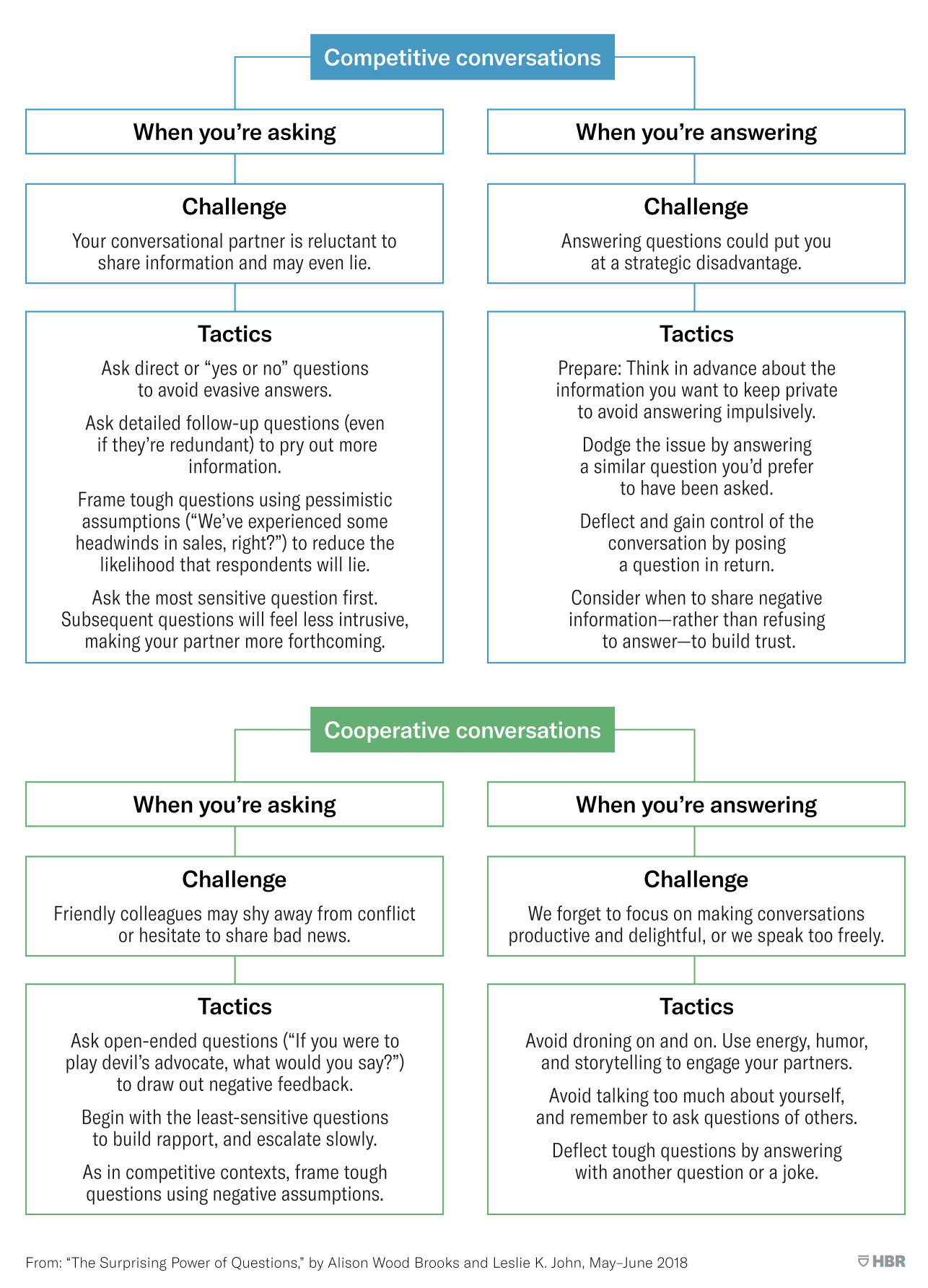Overview
The Problem
Some professionals, such as litigators, journalists, and even doctors, are taught to ask questions as part of their training. But few executives think about questioning as a skill that can be honed. That’s a missed opportunity.
The Opportunity
Questioning is a powerful tool for unlocking value in companies: It spurs learning and the exchange of ideas, fuels innovation and better performance, and builds trust among team members. And it can mitigate business risk by uncovering unforeseen pitfalls and hazards.
The Approach
Several techniques can enhance the power and efficacy of queries: Favor follow-up questions, know when to keep questions open-ended, get the sequence right, use the right tone, and pay attention to group dynamics.
The Surprising Power of Questions
In the May-June 2018 edition of the Harvard Business Review, two associate professors from the Harvard Business School, Alison Wood Brooks, and Leslie K. John, speak to the value and power that good questions can generate. Indeed, there are numerous occasions where you only wish you had asked that burning question but were afraid to ask. This is a skill set that takes time to develop yet can pay significant benefits long term. This week’s thought leadership post is on understanding the value of questions!
In their 7-page article, the two associate Harvard professors cite that several professions are taught to ask questions as part of their basic training: Doctors, Litigators, and Journalists. Most of us don’t have formal training in this, but it is a skill set that can be developed. How often have you worked on a project, brought it forward for review, and had several questions posed? We all recognize this as a healthy challenge process. These challenges help strengthen the finished product, be it a venture summary, a new product launch, or a new ad campaign. Diversity makes that even better. Suppose all participants come from the same homogeneous culture and background. In that case, it doesn’t necessarily provide the valuable lessons learned from different business units, different technologies, or cultures that diversity can bring.
This writer recalls working with a group from the southern tissue facility where we had a significant waste challenge on a specific converting line. A team comprised an engineer, accountant, QC personnel, several hourly workers, and a team lead. The team’s diversity helped resolve the problem: The accounting person helped define that the waste problem spiked during the Winter months. The two hourly employees went out on their own and researched that plastic belts can cause static cling and essentially determined this was a static cling issue caused during the winter months due to far less moisture in the air. Armed with that information, the engineer called several plants to see if they had a similar issue and how they handled it. Sure enough, another facility faced the same problem and recommended that a static eliminator be applied to the plastic belt. After conferring with QC that it was acceptable to add the static eliminator, the results were dramatic. After using this, it instantly eliminated the static, and our waste dropped to practically zero. All based on asking the question, why is this occurring?
The concept is simple enough, but how many times are we in meetings, and the speaker asks if there are any questions? Then the room goes silent. Having led several discussions and participated in numerous meetings, technical conferences, small groups, or one-on-one discussions over the years, this writer can attest to the value of questions, especially well-thought-out ones that are well-timed. Once you get past the awkward stage of asking questions, you become a better listener.
“Be a good listener,” Dale Carnegie advised in his 1936 classic How to Win Friends and Influence People. “Ask questions the other person will enjoy answering.” Unfortunately, more than 80 years later, most people still fail to heed Carnegie’s advice.
When one of us (Alison) began studying conversations at Harvard Business School several years ago, she quickly arrived at a foundational insight: People don’t ask enough questions. In fact, among the most common complaints people make after having a conversation, such as an interview, a first date, or a work meeting, is “/ wish [s/he] had asked me more questions” and”/can’t believe [s/he] didn’t ask me any questions.”






